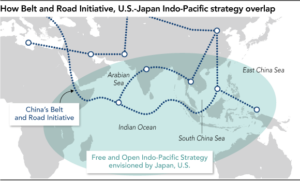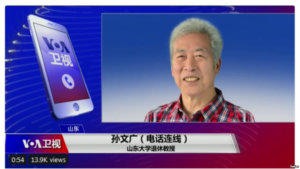
Credit: VOA
A major human rights crisis is unfolding in northwestern China, according to the United Nations, which said last week that there were credible reports that the Chinese government is holding one million or more ethnic minorities in secretive detention camps, The Daily Beast reports:
Yet even for those who have escaped China, surveillance and intimidation have followed. As part of a massive campaign to monitor and intimidate its ethnic minorities no matter where they are, Chinese authorities are creating a global registry of Uighurs who live outside of China, threatening to detain their relatives if they do not provide personal and identifying information to Chinese police. This campaign is now reaching even Uighurs who live in the United States.
Civil society groups and democracy advocates – including Initiatives for China – this week called for a UN investigation, and US sanctions to address the human rights abuses – what the Washington Post calls brutal cleansing – unfolding in Xinjiang.
 Xinjiang province is also a major logistics hub of Beijing’s ambitious Belt and Road Initiative (above), a trillion-dollar infrastructure project along the old Silk Road meant to boost China’s economic and political influence around the world. Xinjiang’s increasing importance to China’s global aspirations is likely a major reason Beijing is tightening its grip, Vox reports.
Xinjiang province is also a major logistics hub of Beijing’s ambitious Belt and Road Initiative (above), a trillion-dollar infrastructure project along the old Silk Road meant to boost China’s economic and political influence around the world. Xinjiang’s increasing importance to China’s global aspirations is likely a major reason Beijing is tightening its grip, Vox reports.
 Concern about Chinese influence operations [what a National Endowment for Democracy report calls “sharp power”] on American campuses hit a new high this year after officials at Arizona State University bragged about mixing the school’s Pentagon-funded Chinese language programs and its Chinese Communist Party-funded Confucius Institute, The Washington Post’s Josh Rogin adds:
Concern about Chinese influence operations [what a National Endowment for Democracy report calls “sharp power”] on American campuses hit a new high this year after officials at Arizona State University bragged about mixing the school’s Pentagon-funded Chinese language programs and its Chinese Communist Party-funded Confucius Institute, The Washington Post’s Josh Rogin adds:
Tucked inside the $716 billion John McCain 2019 National Defense Authorization Act that President Trump signed Monday is a provision barring any U.S. university from using Pentagon resources for any program involving Confucius Institutes, Chinese government-funded language schools embedded inside U.S. colleges. In the future, any universities that have Pentagon-funded and Chinese government-funded Chinese language programs will have to secure a Pentagon waiver if they want to keep both.
 “At the very least, a national discussion is needed to establish best practices and minimize risk,” Rogin argues. “Confucius Institutes must not become one more way Beijing uses money to get American institutions to support the Communist Party’s agenda.”
“At the very least, a national discussion is needed to establish best practices and minimize risk,” Rogin argues. “Confucius Institutes must not become one more way Beijing uses money to get American institutions to support the Communist Party’s agenda.”
China’s “sprawling ambitions are carefully arranged into an ideological architecture—one that has been honed to a startling degree at a time when so many other world leaders appear erratic and unfocused,” notes Julian Gewirtz, the author of “Unlikely Partners: Chinese Reformers, Western Economists, and the Making of Global China”.
 Xi has been explicit that policy work (whether economic policy, foreign policy, or beyond) is meaningful only if it is built on this ideological foundation,” he writes for Foreign Policy. “His ideology aims to strengthen his individual mandate, identify the party with a set of principles, guide the development of policy, and foster values and beliefs in party members and the Chinese people. In other words, it aims to affect reality.”
Xi has been explicit that policy work (whether economic policy, foreign policy, or beyond) is meaningful only if it is built on this ideological foundation,” he writes for Foreign Policy. “His ideology aims to strengthen his individual mandate, identify the party with a set of principles, guide the development of policy, and foster values and beliefs in party members and the Chinese people. In other words, it aims to affect reality.”
China has been reshuffling its propaganda and censorship chiefs recently, the South China Morning Post reports in an effort to “improve the country’s image abroad and ensure online views toe the Communist Party’s line.”

VOA/Wenguang Sun
But the arrest of Sun Wenguang, a retired professor from the Shandong province of northeastern China, during a live-telephone interview with VOA, demonstrates that it is “Beijing’s fierce suppression domestically and its aggressive rhetoric and conduct internationally as a whole that has tarnished and still is tarnishing China’s image abroad,” analyst Charlotte Gao writes for The Diplomat.







